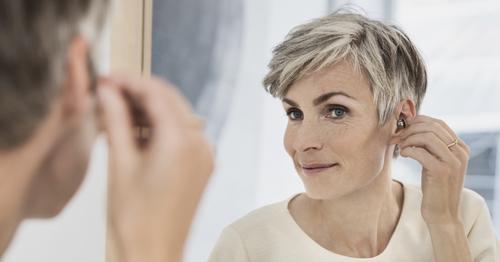The Revolutionary Oticon Opn™ Hearing Aid is Now Invisible
The company behind Oticon Opn™, the world’s first internet connected hearing aid, announces its smallest hearing aid to date featuring Oticon’s revolutionary 360° open sound experience
Copenhagen, Denmark August 20th, 2018 – Only around 40% of people in the UK who need hearing aids have them*. A common deciding factor for many people in choosing a hearing aid is aesthetics. Many would still prefer not to have their hearing aid noticed at all, which is why pioneering hearing aid provider, Oticon, has added an invisible* hearing aid to their world renowned range of Oticon Opn™ hearing aids.
The invisible Opn™ hearing aid is Oticon’s smallest ever and is the most discrete in a new collection of in-the-ear hearing aid styles. Now, reluctant users can choose how visible they want their hearing aid to be and wear their hearing aids with confidence. The new hearing aid styles include Oticon’s groundbreaking BrainHearing™ technology which, very simply put, works super-fast to support the brain and help it make sense of sound. It means that in difficult and noisy listening environments, users are given access to the full soundscape with the ability to separate voices from background noise. Oticon calls this the 360° open sound experience and it delivers a much more natural hearing experience than most traditional hearing aids.
“One of the biggest hurdles for some, when they are first diagnosed with a hearing loss, is overcoming the qualms they have with wearing a hearing aid,” says Ole Asboe Jørgensen, President, Oticon Brand, Global. “We hope that our new invisible Oticon Opn™ will help those who are reluctant to wear hearing aids to address their hearing loss. On average it takes five to ten years before people seek proper tests or help for their hearing loss**; our aim is to help reduce this figure.”
“At Oticon, we develop hearing aids which support the brain in making sense of sound and therefore make it easier for people with hearing loss to enjoy and engage in regular, healthy social interaction. Considering that socialising is such a vital exercise for brain health - it can even reduce the risk of early on-set dementia*** - we want to help more people that are living with hearing loss to confidently enjoy the noisy restaurants or family dinners that they find too challenging. We are delighted to be able to offer our advanced audiology technologies in our new discreet styles, especially if it encourages more people to tackle their hearing loss and as a result enjoy life to the full,” concludes Ole Asboe Jørgensen.
The new in-the-ear range joins Oticon’s behind-the-ear solutions to expand the Oticon Opn™ hearing aid family, offering a variety of styles and feature combinations to meet even more diverse needs and preferences. Oticon Opn™ in-the-ear hearing aids will be made available globally during 2018.
Please check with your local Oticon representative to confirm availability in your region. To discover more about Oticon’s revolutionary hearing aids visit: www.oticon.global/opn.
-ENDS-
*8 out of 10 clients can get an invisible hearing aid from Oticon
About Oticon
500 million people worldwide suffer from hearing loss. The majority are over the age of 50 while eight percent are under the age of 18. It is Oticon's ambition that our customers - hearing clinics throughout the world - prefer to use our products for people with impaired hearing. Through passion, dedication and professional expertise, Oticon develops and manufactures hearing aids for both adults and children. Oticon supports every kind of hearing loss from mild to severe and we pride ourselves on developing some of the most innovative hearing aids in the market. Headquartered out of Denmark, we are a global company and part of William Demant Group with more than 13,000 employees and revenues of over DKK 13 billion. www.oticon.global
*Action on Hearing Loss – Hearing Matters Report – November 2015
**Action on Hearing Loss – Hearing Matters Report – November 2015
***Livingstone et al, 2017 – Dementia prevention, intervention and care
